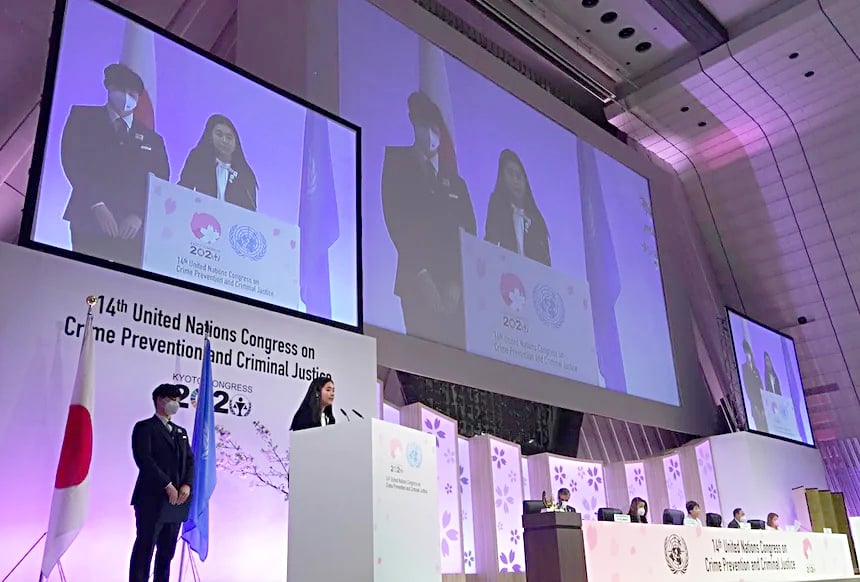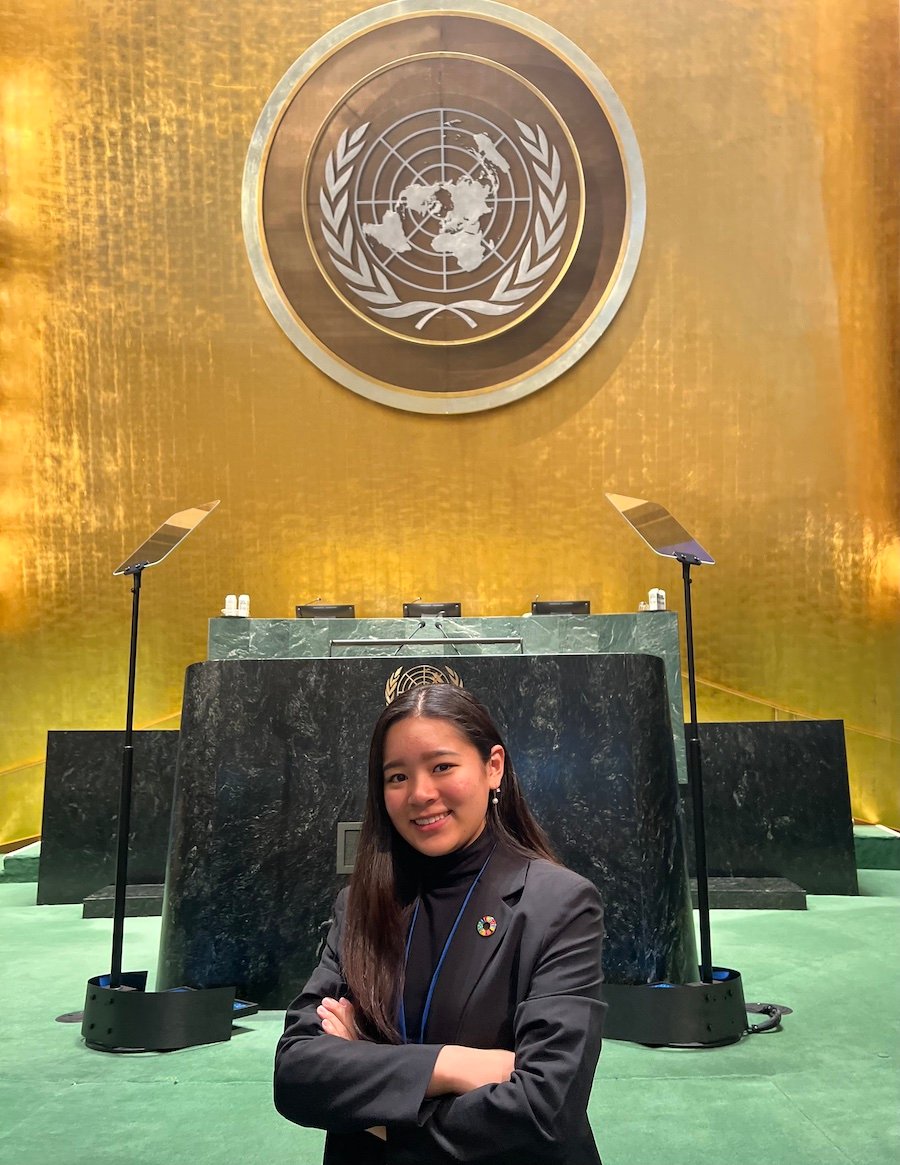
A lot of people ask me: “What motivated you to start your work with the United Nations at such a young age?” I always answer that it was the environment I grew up in and the International Baccalaureate (IB) education I had the privilege to obtain.
I entered NIS at the age of 4, starting in the PYP (Primary Years Program) from grade 1-5, the MYP (Middle Years Program) from grade 6-10, and lastly, graduating from the two-year DP (Diploma Program). As a University student at UBC reflecting on my days at NIS, I now understand the impact the IB program had on my mindset and my ability to serve as a leader on a global stage.
Grades reflect only a part of the story
When you are a student, the number on your report card can seem as though it defines who you are. However, grades do not define you. They only indicate a portion of your learning and capabilities. In fact, much more can be learned from outside the classroom. This was most certainly the case for me.
Even as an early elementary student at NIS, I had the opportunity to volunteer through a school club called Kidzuna. Although at this stage I did not understand the full capacity of what extracurriculars could offer, I realized there were things I could only learn from outside the classroom. The IBDP is known for its rigorous academics that prepare you well for university, but at its core, the IB is a program to foster globally-minded citizens who understand the impact they can make at both a local and international level. This tenet of the IB and NIS encouraged me to continue my extracurricular activities, eventually leading me to, at the age of 16, being selected as the conference Chair of the Youth Forum for the 14th United Nations Congress on Crime Prevention and Criminal Justice. As Chair, I had the privilege of leading 150 youth participants from around the world while working alongside UN officials and government representatives. I delivered a speech to the United Nations at the opening ceremony of their Crime Congress advocating for the importance of youth voice in decision-making and through this role, gained tangible interpersonal skills not easily taught in a classroom. These included networking, intergenerational collaboration, professional public speaking, and work-life balance. I learned to push past my comfort zone while taking on the role of being a leader on a global stage and working with individuals from diverse backgrounds.
At university, it was evident that everyone around me had performed well academically and that their 'good grades' had gotten them there. But I learned that what sets you apart is the experience and skills you bring from outside the classroom. Right from my first year at University, my extracurricular experience served as a powerful backbone in obtaining professional roles. I became the vice president of the UBC branch of AIESEC, a global youth-led organization providing young people with leadership development, cross-cultural understanding, and global exchange experiences. This led to my role in representing the organization at the international level in multiple conferences hosted at the UN Headquarters in New York and serving as a panelist at a national conference in Canada. The unique benefit that the IB provides is to encourage students to believe in their capabilities and see their education beyond their report card. I believe that going beyond the learning inside the classroom is one of the most fundamental aspects that shape the success of IB students in their life beyond the program.
Inquiring is about taking a step back, questioning, and reflecting
One skill that took root back from my PYP days is being an inquirer. From a young age, I was encouraged to keep asking questions, and importantly, NIS provided a safe space to do so. Knowing I could openly inquire pushed me to dive deep into everything I was curious about, including topics considered a norm or even taboo in my multicultural environment. By the time I was in the MYP and DP, being an inquirer had turned into one of my strengths, allowing me to have enough confidence to ask critical questions such as ‘Is what I am being told the only story?’ In today’s society where we are almost spoon-fed information, taking the risk to question norms and being the first one to ask ‘why’ is crucial. Questioning issues around gender inequality led to my role as a delegate at the 67th Session of the Commission on the Status of Women (CSW67) hosted at the United Nations Headquarters in New York. Questioning how youth voices can be better heard took me back to the United Nations Headquarters for the ECOSOC Youth Forum, allowing me to discuss the SDGs with youth representatives from all over the world. I believe the ability to inquire is an invaluable trait for students and is what enables me to continually strive for creating positive change.

What the IB taught me about perspective
Last but not least, I learned that when an opposing perspective exists, it is crucial to focus on ‘how’ the perspective came to be and appreciate opinions different from your own. A vital part of my current role as vice president of AIESEC at UBC is the skill of appreciating different perspectives. The organization consists of multiple portfolios (operations, team management, finance, etc.), and like most companies, success comes with collaboration and mutual respect among board members. That is why whenever I came across an issue, I brought it to the table and prioritized listening to different perspectives before arriving at a solution. This has been an essential tool for me to find innovative solutions that encapsulated diverse perspectives. Having this skill led to my ability to accept critical feedback, which at times is challenging without feeling attacked. This challenge is visible on the international stage and any place where the lack of acceptance and appreciation of different viewpoints becomes a hindrance in global decision-making. Having the ability to listen, accept, and adapt has helped me to successfully collaborate in international and intergenerational environments while advocating for equal participation of all communities.
Don’t get me wrong, the IB wasn’t the only thing that helped get me to where I am now. My achievements come from hours of work and commitment and the people and environment I choose to surround myself with are big reasons for my success. The NIS teachers who never stopped me from inquiring led to my passion for tackling inequalities and injustice. The confidence I gained to inquire spurred me to take action on a global stage with the United Nations. There is nothing more important than surrounding yourself with a strong support system and this is a priority I continue to have as a university student. My goal is to continue making positive change at an international level and be an inspiration for others to take their first step and find their voice. Undoubtedly, NIS and the IB helped me realize this!




